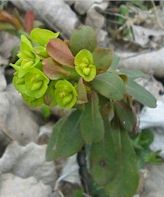|

Spurge |
Conspicuous in Summer by their golden green leaves, and their striking epergnes of bright emerald blossoms, the Wood Spurge, and the Petty Spurge, adorn our woodlands and gardens commonly and very remarkably. Together with many other allied plants, foreign and indigenous, they yield from their severed stems a milky juice of medicinal properties. The name Euphorbioe has been given to this order from Euphorbus, the favorite physician of Juba, King of Mauritania. All the
Spurges possess the same poisonous principle, which may, however, be readily dissipated by heat; and then, in many instances, the root becomes a nourishing and palatable food. For example, the Manioc, a South American Spurge, furnishes a juice which has been known to kill in a few minutes. Nevertheless, its root baked, after first draining away the juice, makes |
a wholesome bread: and by washing the fresh pulp a starch is produced which we know as Tapioca for our table. This is so sustaining that half-a-pound a day is said to be sufficient of itself to support a healthy man. The Indian rubber and Castor oil plants belong also to this order of Euphorbioe.
The Wood Spurge, seen so frequently during our country rambles, suggests by its spreading aspect a clever juggler balancing on his upturned chin a widely-branched series of delicate green saucers on fragile stems, which ramify below from a single rod. Each saucer is the bearer again of sub-divided pedicels which stretch out to support other brightly verdant little leafy dishes; so that the whole system of well poised flowering perianths forms a specially handsome candelabrum
of emerald (cup-like) bloom. The botanical title Spurge is derived from expurgare, to act as a purgative, because of the acrid juice possessing this property. Gerard says "the juice of the Wood Spurge, if given as physic, must be ministered with discretion, and prepared with correctories by some honest apothecary." Furthermore, this juice, "if mixed with honey causeth hair to fall from that part which is anointed therewith, if it be done in the sun." Therefore, what
better place may there be than a wooded English meadow on a sunny day for a clean and convenient natural shave by those of the fair sex who, unhappily, own hirsute facial appendages of which they would gladly be rid? Euphorbia Peplus, the Petty Spurge, is equally common, and often called "wart weed." It signifies, "Welcome to our house," and turns its flowers towards the sun. The Irish Spurge (Hiberna), is so powerful that a small bundle of its
bruised plant will kill the fish for several miles down a river. Yet another Spurge (Lathyris), a twin brother, bears caper-like seeds which are sometimes dishonestly pickled and sold as a (dangerous) substitute for the toothsome flowerbuds taken in sauce with our boiled mutton. The whole tribe of Spurges contains two hundred genera, and forms, what we call now-a-days, "a large order." The roots of several common kinds are used in making quack medicines, which are unsafe, and
violent in action. Because of its milk-white sap the Wood Spurge bears the name in Somersetshire of Virgin Mary's Nipple: and yet in other parts, for the like reason, this plant is known as Devil's Milk. Chemically, most of the Spurges contain caoutchouc, resin, gallic acid, and their particular acrid principle which has not been fully defined. In France the rustics sometimes purge themselves with a dose of from six to twelve grains of the dried Wood Spurge: and its juice is
used in this country as an application to destroy warts; also, to be rubbed in behind the ear for ear-ache, or face-ache. The famous surgeon, Cheselden, employed a noted plaster made with the resin of Spurge for relieving disease of the hip joint by counterstimulation. But, to sum up, I would say with wise Gerard, "these herbes by mine advice should not be received into the body, considering there be so many other good and wholesome potions to be made with other herbes that
may be taken without peril." Nevertheless, a tincture prepared (H.) from the Wood Spurge, with spirit of wine, may be given admirably in much diluted doses for curing the same severe symptoms which the plant produces when taken to a toxical degree. Offensive diarrhea, with prolapse of the lowest bowel, will be certainly remedied by four or five drops of this tincture, first decimal strength, with water, every two or three hours: especially if, at the same time, there be a
burning and stinging soreness of the throat. Said young Rosamond Berew (1460), in Malvern Chase, concerning "a tall gaunt figure," noted for her knowledge of herbs, sometimes called the Witch, but worshipped by the hinds and their children:--"There is Mary, of Eldersfield; I expect she has been on Berthill after Nettles to make a capon sit, or to gather Spurges for ointments."
Herb Simples
The Primitive Simplers presented here show the way of life in other generations, it is not suggested or recommended trying them yourself. |
|
Garden
Herbs
Home
History of Herbs
Herb Gardening
Herbs for Beginners
Drying & Preserving Herbs
Indoor Herb Gardening
Herb Garden
Hints & Tips
Herbal
Cooking
Herb Chart
Using Herbs
Culinary Herbs
Herb
Oil and Vinegar
Herb Teas
Herb Candy
Herb Jelly
Herb Simples
Preface
Introduction
Alphabetical Listing

Trade
Recipes Online
Share your Recipes with others!!
|


